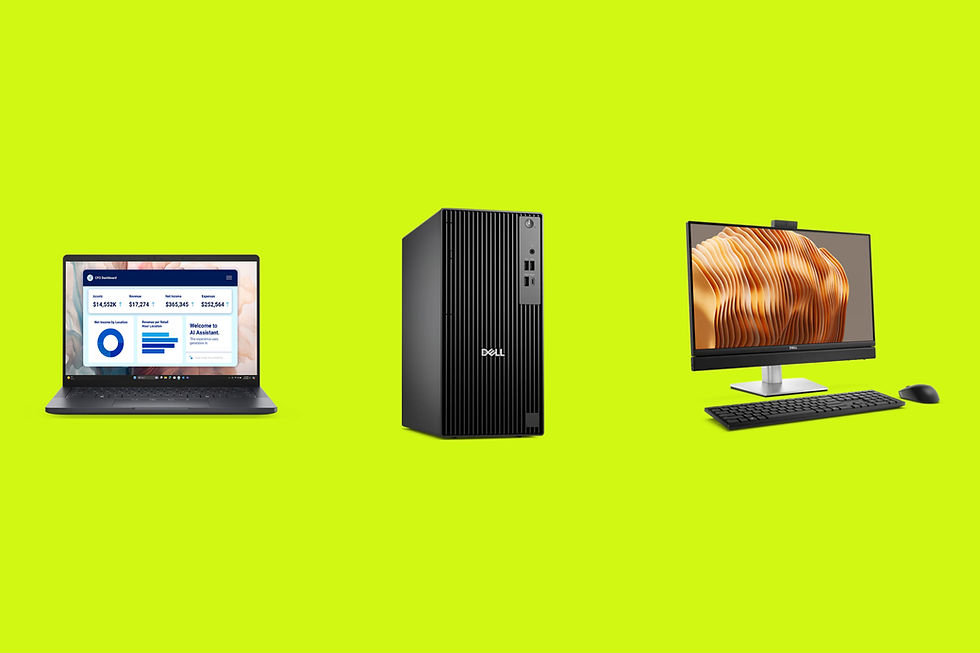The Computer Shopping Guide
- sneuman85
- Jun 11, 2025
- 4 min read
Updated: Jul 3, 2025
Explore our friendly walkthrough to find the best computing solutions tailored for your needs. Gigo Computing offers expert technology assistance and a comprehensive computing guide to help you make informed decisions.

Let’s face it—shopping for a computer can feel like learning a new language. Processors, RAM, SSDs, graphics cards… it’s a lot. At Gigo Computing, we believe you don’t need to be tech-savvy to make smart tech decisions. Whether you’re buying your first laptop or upgrading your desktop at home, this guide is here to walk you through it, step by step.

Computer or Laptop? Which One Fits You Best?
The first decision is simple: do you need something portable, or will it stay in one place?
Desktop computers are great for workstations, home offices, or anyone who needs power and doesn’t mind staying put. They’re usually faster for the price and easier to upgrade later.
Laptops are compact, battery-powered, and ideal for people on the move—on field and remote workers, or those with limited space.
Tip From Gigo: If you plan to use your computer mostly at a desk, go desktop. If you need flexibility and portability, a laptop is the way to go.

Understanding the Processor (CPU)
This is your computer’s “brain.” A stronger processor means smoother performance.
Here are the most common processors:
Intel Core i3 / AMD Ryzen 3 – Basic needs: browsing, emails, light work.
Core i5 / Ryzen 5 – Best for everyday use: Office work, multitasking, runs well with all basic programs.
Core i7 / Ryzen 7 – Handles demanding work: editing, design, heavier worksheets.
Core i9 / Ryzen 9 – For pros who do high-performance work daily.
Tip From Gigo: The generation matters too! A 13th Gen i5 might beat an old i7. Don’t just look at the name—check how new it is.

RAM: Your Computer’s Short-Term Memory
RAM helps your computer juggle tasks. If the processor is the brain, RAM is the "workspace."
4GB RAM – Bare minimum, only for basic browsing.
8GB RAM – Great, recommended for normal light work .
16GB RAM – Ideal for most users and daily tasks, using multiple programs, or using many tabs at once.
32GB+ RAM – Reserved for power users like video editors, gamers, and professionals.
Tip From Gigo: Go with at least 8GB—it makes everything feel snappier.

Storage: Where Your Files Live
Storage isn’t just about how much space you have—it also affects speed.
HDD (Hard Disk Drive): Cheaper, more space, but slower.
SSD (Solid State Drive): Much faster, more reliable—boots in seconds.
Common sizes:
256GB SSD – Good for light users.
512GB SSD – Just right for most.
1TB SSD or more – Best for storing lots of photos, videos, or games.
Tip From Gigo: Always choose an SSD over an HDD if possible. It’s one of the biggest speed upgrades you’ll feel.

Features and Extras That Matter
Specs are important, but so is how it feels to use your computer.
Think about:
Screen Size & Resolution – Want something compact or easy on the eyes?
Keyboard & Touchpad Comfort – Do you type a lot?
Battery Life – Crucial if you’re mobile.
Ports – Need USB, HDMI, or SD card slots?
Touchscreen – If you like to work flexibly directly with screen
Tablet Mode / 2-in-1 – Great for Travelers, designers, or casual use.

Home, Business, and Gaming Computers: What's the Difference?
This is where a lot of people get mixed up, so let’s break it down.
Great for families, casual users, and everyday tasks.
Web browsing, streaming, homework, managing finances
Focused on ease of use, not high-end specs
Often all-in-one desktops or basic laptops
Built for reliability, security, and getting work done.
Stronger build quality, longer support, fewer distractions (less bloatware)
Often includes fingerprint readers, better keyboards, and enterprise features
Great for professionals, office users, and small business owners
Designed for performance and graphics power.
High-end CPUs and dedicated graphics cards (GPUs)
Often have advanced cooling systems, RGB lighting, and powerful displays
Excellent for gamers, creators, or anyone who runs heavy applications
Tip From Gigo: Don’t be fooled by looks. A flashy “gaming laptop” isn’t better for everyone. If you’re not gaming or editing videos, you might not need it.

Understanding Desktop Models
Ultrabooks – Lightweight and sleek, great for travelers and professionals.
Business Laptops – Reliable and durable, often with extra security features.
Gaming Laptops – Big and powerful, built for speed and graphics.
2-in-1 Convertibles – Laptops that fold into tablets—great for creative and casual users.
Tip From Gigo: Match your laptop to your lifestyle. Field workers and travelers often need something light with all-day battery life.

Final Thoughts: What’s Right for You?
There’s no one-size-fits-all. Choosing a computer is like choosing a car—it depends on your needs, your budget, and your priorities.
Ask yourself:
What will I use this computer for—home, work, entertainment, or all three?
Do I care more about speed or price?
Do I need it to be portable?
Will I want to upgrade it later?



Comments